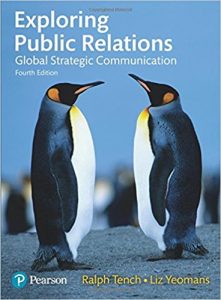How to ace your PR degree (part 2)
About the author
Our guest authors are what make PR Place such a vibrant hub of information, exploration and learning.

Our Guest Author for this post is Polly Foster – a professional web editor and social media content producer who has gained an MSc in Corporate Communication from Leeds Beckett University.
This is part two in my series on how to ace your PR, marketing or communications degree.
The first installment focused on how to choose interesting assignments that allow you to contribute something original while improving your career prospects.
This time we’re concentrating on an approach to take when researching and writing those assignments – questioning everything.
Question the research
You’ve probably heard that you should read academic papers with a critical mindset.
This doesn’t mean approaching them negatively and looking for things that are wrong, but it does mean you should keep your eyes peeled for anything that doesn’t fit with other sources you’ve read, or anything that might not work for your purposes.
For instance, pay particular attention to the target population of the studies you read. The research may have been conducted with a very different group to the one you’re interested in.
Let’s say studies have shown that Asian students have a more favourable impression of traditional universities than American students do. So if you take the conclusions of the Asian study and apply them unquestioningly to an American population then you could be going down the wrong path.
But this also means there may be a gap in the research. If you’ve read part one of this series then you’ll know that identifying areas that no one has written about before is a key way to ace your degree. If the research you’re interested in hasn’t been applied to the population you’re interested in then it might be down to you to make it happen. It’s your time to shine!
Question the theory
Sometimes in your reading you’ll come across a theory that seems perfect for your topic, but when you try to apply it to your data it doesn’t quite fit. For example, you might be looking at how to segment stakeholders into different categories, but some stakeholders don’t seem to fit anywhere and some fit into more than one group – what’s going on?
Don’t panic, and don’t try and squeeze your findings into a model that’s not right. It’s probably not your data that’s wrong – you’ve just found a limitation of the model you’re using.
This is where you should start getting excited because you’ve now got a great opportunity to show off your critical thinking skills by identifying exactly what the problem is, and possibly even offering some ways to improve it.
It doesn’t mean that you’re rubbishing the researcher’s work, it just means that their theory doesn’t fit in all cases. No model can be perfect!
Question yourself
Finally, it’s important to question yourself.
This doesn’t mean that you should be working under a constant cloud of self-doubt and uncertainty, but it does mean that you should be self-aware enough to recognise when you’re making choices in your work and be able to justify these decisions.
For instance, why are you choosing to define the key concepts in the way that you are? Why did you choose those research methods? It may seem obvious to you, but the person marking your work is not a mind reader!
If you justify the decisions that you make then you stop merely describing everything and you start showing more critical thinking skills.
Imagine your rival was looking through your work trying to find something to call you out on – would they find anything?
A recurring theme in this article is that questioning everything leads to opportunities to use critical thinking and excel in your degree.
It may be frustrating when a theory doesn’t quite work, or when a piece of research is focused on students when what you’re interested in is families, but this gives you the chance to explain the limitations and overcome them in your own work.
A great result awaits!